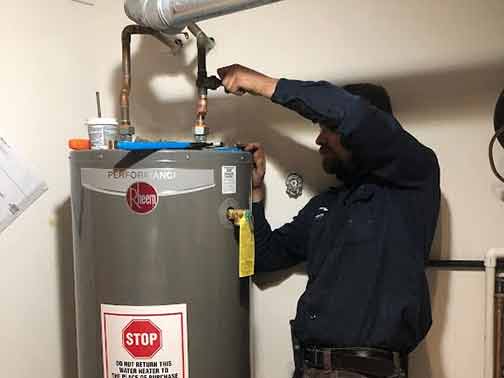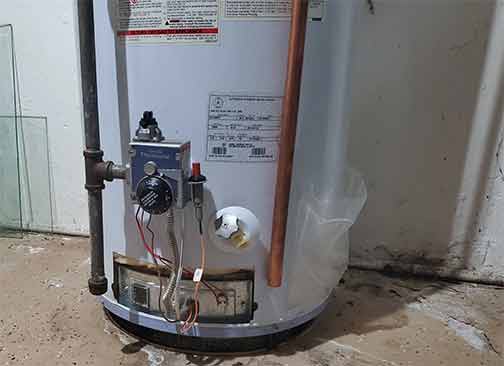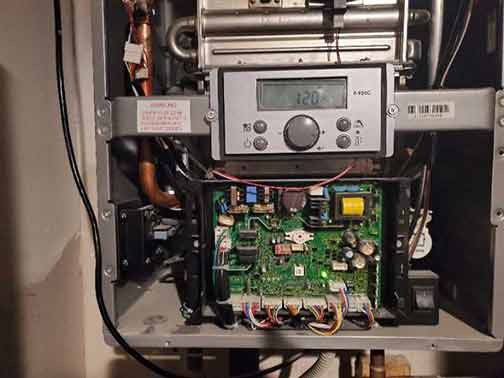
Are you thinking of replacing the storage water heater in your home? One of the questions you may ask is whether it is better to switch to a tankless water heater. Tankless and storage water heaters have their advantages, but the best one for your home depends on your needs advises Real Property Management Prestige.
In this brief post, we explain the pros and cons of switching from a traditional water heater to a tankless water heater. But before we talk about those pros and cons, here is a short reminder of how a storage water heater is different from a tankless water heater.
Storage (traditional) water heater
Storage tanks have a large water tank that typically holds 40 – 120 gallons of water. This tank is filled with water, and the water is heated. When a hot water tap in the home is turned on, hot water is released from the top of the tank. The tank is then refilled from the bottom until it is full before the water is reheated. This process continues as long as the water heater is on.
Tankless water heater
Tankless (on-demand or instantaneous) water heaters do not have tanks. Water is heated only when needed by passing it through a heat exchanger (high-powered burners). The heated water is then supplied directly to the tap, shower or appliance instead of being stored in a reservoir. A tankless system heats water at an average rate of 2 to 5 gallons per minute.
Pros and cons of switching to a tankless water heater
Pros
Saves energy
Since tankless water heaters don’t have to keep a large volume of water heated continuously, they use less energy. Tankless water heaters also don’t suffer from heat loss, a problem which plagues traditional water heaters. Using a tankless system will result in lower monthly utility bills.
Takes up less space
The absence of a tank means that a tankless system doesn’t need as much space as a storage water heater. A tankless water heater can easily fit into a cabinet. With an anti-freeze kit, you may even install it outdoors. That creates more room in your home.

Unlike traditional water heaters that require you to wait until the stored-up hot water runs out, there is no downtime when using a tankless water heater.
Endless supply of hot water
Tankless water heaters are more efficient. They provide an almost endless supply of hot water. Unlike traditional water heaters that require you to wait until the stored-up hot water runs out, there is no downtime when using a tankless water heater.
Zero risk of water damage
Tankless water heaters eliminate the risk of property damage due to a faulty tank. Since there is no tank, there is also no possibility of leaks. With a tankless system, you will never have to fear that your water heater tank will corrode and rupture.
Longevity
On average, a tankless water heater lasts twice as long as a traditional water heater. While the average lifespan of a traditional water heater is 10 – 12 years, a tankless water heater can serve you for up to 20 years. Tankless water heaters are a longer-term investment.
Cons
Higher upfront cost
The first major drawback of tankless water heaters is they cost more than traditional water heaters. In addition to being more expensive than a traditional water heater, you may have to update certain home features to accommodate the new water heater.

In addition to being more expensive than a traditional water heater, you may have to update certain home features to accommodate the new water heater.
Lower flow rate
A tankless water heater provides enough hot water only if you are using one fixture in your home. When using multiple fixtures or appliances at once, a tankless water heater cannot keep up with the demand. It is also hard to get lukewarm water with a tankless system.
You may need multiple units
To make up for the low flow rate of the tankless water heater and the shortage of hot water it causes, you may have to install more than one tankless system in your home. That is a huge problem, considering that tankless water heaters are expensive.
Needs more maintenance
Tankless water heaters are highly susceptible to mineral buildup. You have to flush the unit regularly to get rid of mineral buildup. Tankless systems also require you to replace worn-out parts regularly. That is something to think about before you buy one of these units.
Longer installation time
To install a tankless water heater in your home, you may need to upgrade your gas line and add new venting. In some cases, you will need a dedicated electrical circuit. All these add to the installation time and cost of a tankless water heater.
Based on the above, is it a good idea to switch to a tankless system? Only you can answer that question.
But if you do choose to go ahead and make the switch, be sure to talk to a professional plumber nearby before you buy your tankless system. That will ensure that the tankless water heater you purchase is adequate for your home’s needs.



